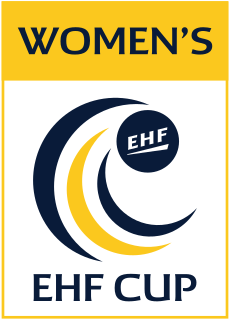The 1986–87 Women's IHF Cup was the sixth edition of IHF's second-tier women's handball competition.

The Women's EHF Cup is an annual competition for women's handball clubs of Europe. It is organized by the EHF. It is currently the second-tier competition of European club handball, ranking only below the EHF Champions League.

The International Handball Federation (IHF) is the administrative and controlling body for handball and beach handball. IHF is responsible for the organisation of handball's major international tournaments, notably the IHF World Men's Handball Championship, which commenced in 1938, and the IHF World Women's Handball Championship, which commenced in 1957.
1985 Cup Winners' Cup champion Budućnost Titograd defeated Štart Bratislava in the final, overcoming an away loss by a 5-goal margin, to become the second Yugoslav team to win the competition. They previously defeated defending champion SC Leipzig and 1983 champion Avtomobilist Baku on away goals. [1]
The 1985–86 Women's IHF Cup was the fifth edition of the competition. It was contested by fifteen teams instead of the eighteen of the previous edition, so the preliminary round was suppressed and the defending champion's representative was granted a bye to the quarter-finals. Like the one year before, the final confronted the East German and Hungarian teams, with the same outcome; 2-times European champions HC Leipzig overcame in its arena Debreceni VSC's 6 goals first-leg win to win its fourth IHF title.
The 1982–83 Women's IHF Cup was the second edition of the competition, taking place between October 1982 and 1 May 1983. A round of 16 was introduced as the tournament was expanded from 11 to 17 teams, with Austria, Czechoslovakia, Denmark, Portugal, Spain and Switzerland making their debut. Avtomobilist Baku became the first Soviet team to win the competition by beating Empor Rostock in the final, while TJ Topolniky and TC Veszprém also reached the semifinals and defending champion RK Trešnjevka was defeated by compatriot Sekulić Sombor in the Round of 16.
The away goals rule is a method of breaking ties in association football and other sports when teams play each other twice, once at each team's home ground. By the away goals rule, the team that has scored more goals "away from home" will win if scores are otherwise equal. This is sometimes expressed by saying that away goals "count double" in the event of a tie.



